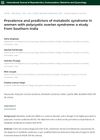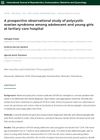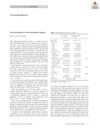December 2024 in “Journal of Clinical Medicine” PCOS and eating disorders are linked by hormonal imbalances, needing personalized treatment.
 August 2023 in “Journal of Clinical Medicine”
August 2023 in “Journal of Clinical Medicine” Metformin lowers prolactin in women without PCOS but not in those with PCOS, where it reduces other hormones instead.
 July 2023 in “Journal of Clinical Medicine”
July 2023 in “Journal of Clinical Medicine” Tirzepatide might help manage PCOS in obese patients but needs more research to confirm safety and effectiveness.
 January 2022 in “Journal of family medicine”
January 2022 in “Journal of family medicine” Polycystic Ovarian Syndrome (PCOS) can cause chronic inflammation, mental health issues, and changes in gut bacteria, but a holistic lifestyle change can significantly improve these conditions.
 947 citations,
February 2004 in “The Journal of Clinical Endocrinology and Metabolism”
947 citations,
February 2004 in “The Journal of Clinical Endocrinology and Metabolism” Most women with excess male hormones have Polycystic Ovary Syndrome, and hormonal therapy can improve symptoms but may cause side effects.
 19 citations,
January 2019 in “Ginekologia Polska”
19 citations,
January 2019 in “Ginekologia Polska” The combined Myo-inositol and D-chiro-inositol treatment improved weight, hormone levels, and skin conditions in women with PCOS.
 6 citations,
January 2015 in “International journal of reproduction, contraception, obstetrics and gynecology”
6 citations,
January 2015 in “International journal of reproduction, contraception, obstetrics and gynecology” More than half of the women with PCOS in Southern India had Metabolic Syndrome, with large waist circumference being the most common feature.
 1 citations,
July 2023 in “Frontiers in Immunology”
1 citations,
July 2023 in “Frontiers in Immunology” Oxidative stress and immune dysfunction are linked to both Hashimoto's thyroiditis and polycystic ovary syndrome, with diet and specific treatments important for managing these conditions.
 March 2023 in “Journal of Education, Health and Sport”
March 2023 in “Journal of Education, Health and Sport” Women with Polycystic Ovary Syndrome have a higher chance of getting depressed.
 60 citations,
October 2014 in “Journal of the American Academy of Dermatology”
60 citations,
October 2014 in “Journal of the American Academy of Dermatology” Dermatologists play a key role in treating skin symptoms of PCOS like dark patches, excess hair, acne, and hair loss.
 4 citations,
January 2012 in “Journal of the Egyptian Women's Dermatologic Society (Print)”
4 citations,
January 2012 in “Journal of the Egyptian Women's Dermatologic Society (Print)” Women with female pattern hair loss may have a higher risk of developing metabolic syndrome.

Women with female pattern hair loss may have a higher risk of metabolic syndrome.
 August 2022 in “International journal of reproduction, contraception, obstetrics and gynecology”
August 2022 in “International journal of reproduction, contraception, obstetrics and gynecology” The study found that 7.21% of young girls have polycystic ovarian syndrome, with symptoms like irregular periods, abnormal hair growth, and acne. Early diagnosis is important to prevent long-term complications.
 7 citations,
August 2017 in “European Journal of Obstetrics & Gynecology and Reproductive Biology”
7 citations,
August 2017 in “European Journal of Obstetrics & Gynecology and Reproductive Biology” Lower vaspin levels in the blood may indicate a better response to fertility treatment in women with PCOS.
 19 citations,
January 2015 in “Indian Journal of Dermatology”
19 citations,
January 2015 in “Indian Journal of Dermatology” Skin changes in women with PCOS are mainly due to hormonal imbalances.
 14 citations,
May 2013 in “American Journal of Physiology-endocrinology and Metabolism”
14 citations,
May 2013 in “American Journal of Physiology-endocrinology and Metabolism” Removing myelin protein zero-like 3 in mice leads to better metabolism and resistance to obesity.
 25 citations,
January 2013 in “International Journal of Trichology”
25 citations,
January 2013 in “International Journal of Trichology” Premature balding in some men may be linked to altered hormones, but it's not the male equivalent to polycystic ovary syndrome or metabolic syndrome.
 2 citations,
February 2023 in “BMC women's health”
2 citations,
February 2023 in “BMC women's health” Birth control pills change the activity of certain inflammation and blood clotting genes in women with PCOS.
 August 2024 in “Medicine”
August 2024 in “Medicine” Most patients with PCOS were prescribed medroxyprogesterone acetate or oral contraceptives, with some experiencing side effects or needing prescription changes.
 116 citations,
December 2017 in “International Journal of Women's Dermatology”
116 citations,
December 2017 in “International Journal of Women's Dermatology” Adult female acne treatment should be personalized, considering individual preferences and pregnancy, using various topical and oral medications while managing side effects and resistance.
4 citations,
January 2018 in “JBRA assisted reproduction” Orlistat helped reduce weight and testosterone in obese women with PCOS but did not significantly affect other androgens or cholesterol levels.
 October 2023 in “IntechOpen eBooks”
October 2023 in “IntechOpen eBooks” Genes and epigenetic changes are important in the development of Polycystic Ovary Syndrome.
 20 citations,
November 2019 in “International Journal of Environmental Research and Public Health”
20 citations,
November 2019 in “International Journal of Environmental Research and Public Health” Breathing in high levels of certain air pollutants significantly increases women's risk of developing Polycystic Ovary Syndrome.
13 citations,
March 2012 in “The American Journal of Surgery” Modified laparoscopic sleeve gastrectomy effectively controls diabetes and treats obesity with minimal complications.
 2 citations,
November 2018 in “Clinical and Experimental Dermatology”
2 citations,
November 2018 in “Clinical and Experimental Dermatology” Acne is more common in men with male pattern baldness due to increased hormone levels.
 56 citations,
December 2011 in “Steroids”
56 citations,
December 2011 in “Steroids” The document suggests treating individuals with nonclassic congenital adrenal hyperplasia who show symptoms, especially those related to excess male hormones.
 10 citations,
April 2018 in “Maturitas”
10 citations,
April 2018 in “Maturitas” Excess male hormones in postmenopausal women can cause health issues and increase the risk of heart disease and diabetes; treatment depends on the cause.
 41 citations,
April 2010 in “Gender Medicine”
41 citations,
April 2010 in “Gender Medicine” The conclusion is that hirsutism should be diagnosed and treated because it affects quality of life and may signal other health problems.
 9 citations,
November 2012 in “Archives of Dermatological Research”
9 citations,
November 2012 in “Archives of Dermatological Research” MC4R gene variants not linked to female hair loss.
 7 citations,
January 2022 in “Animal Reproduction”
7 citations,
January 2022 in “Animal Reproduction” Using rodents for research shows that health problems in the womb can cause diseases later in life.


























